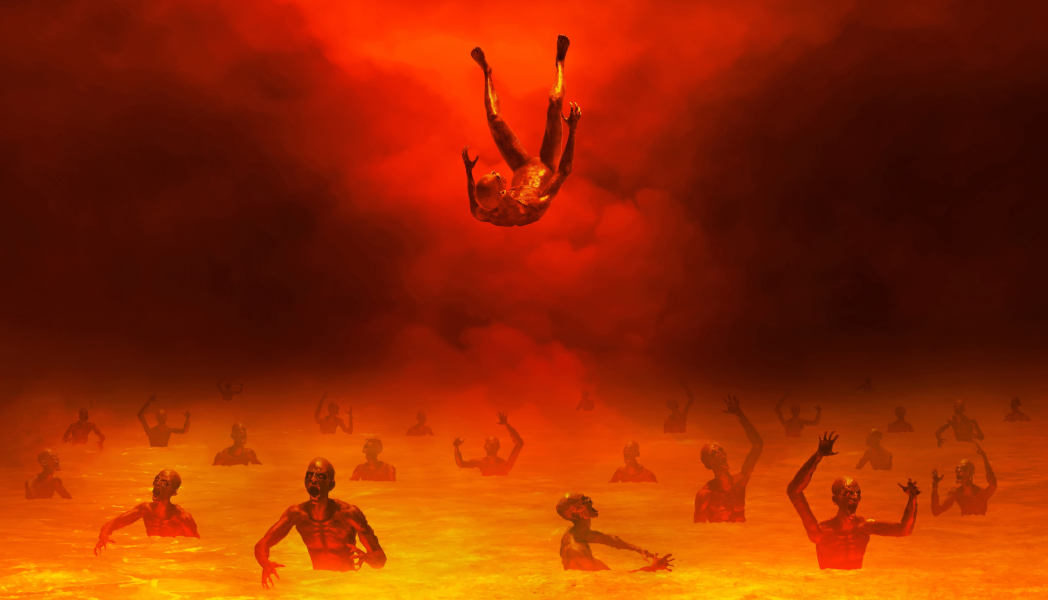Reading time: 3 min.
In this passage, taken from his 1887 memoirs, Don Giovanni Bosco recounts the most disturbing of his dream visions: the descent into the torments of hell. The dream, which he had on the night of 2nd-3rd April, left him exhausted and trembling, so powerful was the feeling of witnessing the eternal fate of sinners. Through earth-shattering noises, inhuman screams, and monstrously deformed figures, the saintly educator aims to warn young people about the destiny that awaits those who boast of earthly possessions and neglect their souls. The intense, almost cinematic narrative culminates in an urgent plea for prayer and frequent communion, the only remedies capable of breaking the chains of evil and definitively guiding life towards salvation.
On the morning of April 3rd, he told Father Viglietti that he had been unable to sleep the night before, because he had been thinking over a frightful dream, which he had had during the night of the 2nd. All of this had thoroughly exhausted him.
“If the boys were to hear the story of what I saw,” he said, “they would either give themselves to a life of holiness, or they would run away in terror, so as not to hear how the dream ended. Besides, it is impossible for me to describe it all, just as it would be difficult to draw a genuine picture of the punishments in store for sinners in the hereafter.”
He had seen the pains of hell. First he heard a terrible noise, like the noise of an earthquake. Then and there he did not give any great attention to it. But the noise gradually grew louder until he heard a long, drawn out, and terrifying rumble, mixed with screams of terror and agony, inarticulate human voices which mingled with the general din to produce a horrifying uproar. He looked around him apprehensively to try to find the cause of such a pandemonium, but he could not discover anything. The ever more deafening noise was getting closer, but it was no longer possible for either eyes or ears to discern what was happening.
Don Bosco went on with his description: “At first I saw something like a mass, a shapeless voluminous something which gradually shaped into a gigantic barrel of fabulous proportions: The painful cries were coming from it. Terrified, I asked what it might be, and what could be the meaning of what I was seeing. Then the screams, which until that moment had been inarticulate, grew louder and more distinct, so that I made out these words: Multi gloriantur in terris et cremantur in igne [Many will be glorified on earth and be burnt by fire]. Then I saw inside that kind of barrel some people with indescribable deformities: their eyes were coming out of their sockets; their ears, almost torn away from their heads, were hanging down; their arms and legs were dislocated in a ghastly manner. Intermingled with the human screams were the strident meowing of cats, the rabid barking of dogs, and the roaring of lions, the howling of wolves, and the snarls of tigers, bears, and other animals. I looked closer and among those unfortunate people I recognized some. Then even more frightened I asked again what such an unusual spectacle could mean. I was given this answer: Gemitibus inenarrabilibus famem patientur ut canes ” [with inexpressible groanings they will be as hungry as dogs].
Meanwhile, as the racket increased, his perception of things also grew clearer and more vivid. He was better able to recognize those unhappy souls, he heard more clearly their cries, he felt more oppres- sively his own terror. He yelled out some questions: “Will there be any remedy for, or escape from such a disaster? Is such an array of horror, such a tremendous punishment, set for us? What must I do?” “Yes,” a voice answered him, “there is a remedy, but only one: to hasten to pay one’s debts with gold and silver.”
“But these are material things.”
“No; aurum et thus [gold and incense]. Unceasing prayer and frequent communion will provide a remedy for such an evil.” During this dialogue, the more anguished were the shrieks heard, the more monstrous were the appearances of those who shrieked, so that, frightened to death Don Bosco woke up. It was three o’clock in the morning, but it was impossible for him to go back to sleep. As he told the story he was trembling all over his body; he was hardly breathing, and in tears.
(MB IT XVIII, 284-285 / MB EN XVIII, 240-241)

